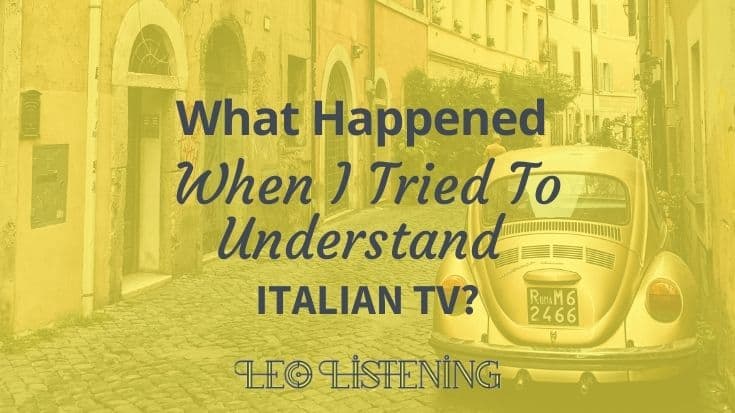What Happened When I Tried To Understand Italian TV?

Updated June 2021
How many TV channels do you have?
Thanks to digital TV, we have hundreds, if not thousands of channels.
We can watch:
- Turkish channels
- Armenian channels
- Latin American channels
You name it, I think we’ve got it.
When it comes to Italian TV, we’re well-served. We’ve got all the Rai channels (Radiotelevisione italiana S.p.A., the public broadcasting company). Sometimes, with my partner, we try to watch and understand them. We both speak French (he is French) and we’ve also studied Spanish.
Understanding Italian should be a piece of cake.
So we decided to test the theory.
A while back, we found ourselves watching an Italian documentary about archaeology, one of our favourite subjects. We were pleased as we could catch some words similar to French and Spanish and more or less follow the programme.
It helped that the university professors spoke fairly slowly as they were there to educate us. It wasn’t one of those documentaries with just talking heads either. Images of old bones and pottery aided our comprehension.
We were feeling ambitious about our Italian language skills.
We thought we could master the language just from watching TV.
Our ambition soon turned to disappointment when we tried another type of programme.
Have You Ever Seen An Italian Game Show?
They’re famous for their loud, brash style and their bella ragazzi. We couldn’t understand a thing. Chaos reigned: the presenter shouting, other people talking, everyone laughing, bright lights. We couldn’t pick up anything, not even words that sounded like French or Spanish.
Think about it for a minute.
We’re talking about the same language.
Not that Italian doesn’t vary in the different regions of Italy. But this was on TV.
Surely, everyone speaks the same standard variety of the language on TV?

Game Shows Vs Documentaries
Well, not necessarily. Spoken language is not uniform. We speak in different ways in different circumstances and on TV the situation is no different. When you’re an archaeology lecturer, informing the general public about your discoveries for a documentary, you certainly don’t speak the same way as a TV game show host.
You speak more slowly and carefully. Your aim is to educate, not entertain. You’re filmed down in the trench you’ve just dug, or looking at some old bones to explain your point. Everything you’re saying has been carefully pre-planned. And after it’s edited by the TV crew.

An archaeologist working in a trench
On the game show, the aim is to entertain. Broadcast to a mass audience. And make some money for the TV station by selling advertising space. It’s fun, spontaneous, loud and informal.
But you can also:
- make things up on the spot
- have a laugh with the guests and your fellow presenters
- use slang and informal expressions
- make jokes
Things you would typically do in conversation with friends.
As far as I’m aware, no-one speaks slowly and carefully to their friends about archaeology while showing them an old pile of bones right?
If you do I’m sorry, I guess we just don’t have the same friends!
So What’s This Got To Do With English?
Many English learners think they understand conversational English better than academic English.
In other words you understand the equivalent of a game show on Italian TV better than an archaeology documentary.
Strange, isn’t it?
While the presenters of the archaeology documentary might use more complex words and explain complex ideas, the delivery is slower and more careful. Even if you don’t catch a new word, or understand a concept, you can follow the main ideas without getting too lost.
Compare that to a TV show host babbling away spontaneously at a million miles an hour, using slang and eating their words. Maybe the words and ideas aren’t particularly complex. But they don’t sound how you expect them to sound.
I mean, in my case, I managed to catch some words similar to French and Spanish in the documentary. Surely, the TV show host used similar ones? But I couldn’t catch them due to the speed, mixed in with some slang, jokes and cultural references that I wouldn’t get.
Not understanding a documentary isn’t so bad either.
You can go back and listen to that section again or use the visuals to help you. If there are some new concepts that come up, you can go and read about them in a book to familiarise yourself with them better.
The other day we were listening to a radio show about space: we understood the French perfectly, but the concepts to do with space, time, gravity and the universe, went way beyond us! I guess we’ll have to add A Brief History of Time to our reading list.
Connecting With English Speakers Who Don’t Come With Subtitles
But when you’re talking to a friend, or a chatting with colleagues on your lunch break
- you can’t go back and listen again
- you can’t spend the conversation asking them to repeat themselves
- you have to reply to them to keep the conversation going
Add in background noise, distractions, slang, jokes plus cultural references and you’ve got a recipe for incomprehension. Even if the rest of the vocabulary and ideas aren’t particularly complex (last night’s TV, their plans for the weekend).
And the consequences are greater. Not understanding means not connecting.
If you can’t follow
- you might miss out on some work gossip
- you won’t know what they’re planning to do after work
- you might stay quiet during conversations – or give up altogether.
In time, you might feel less integrated with your English-speaking friends and colleagues.
If you express yourself well, it’s even worse. They’ll assume you’ll understand everything. And might be surprised and confused when they find out you haven’t. Because you don’t do something you’re supposed to. Or because you don’t laugh at their jokes.
You see, native English speakers have been described as the world’s worst communicators. They don’t know how to adapt their language to learners. They have no idea you don’t understand. And you’re probably giving the impression that you do.